Report: Academic Integrity, Misconduct, and Game Development Skills
VerifiedAdded on 2023/06/18
|10
|3065
|203
Report
AI Summary
This report provides a comprehensive analysis of academic integrity, its importance in higher education, and the implications of academic misconduct. It emphasizes the core values of honesty, trust, fairness, respect, and responsibility in academic work. The report also assesses the steps taken and difficulties encountered during the production of a game designed to highlight the significance of academic integrity and avoiding plagiarism. The Gibbs reflective model is used to evaluate the experience, focusing on planning skills, student engagement, and lessons learned. Furthermore, the report identifies key skills acquired, such as Microsoft PowerPoint proficiency and research abilities, throughout the academic year and during the game development process. The ultimate goal is to promote a positive learning environment and enhance students' understanding of academic integrity.
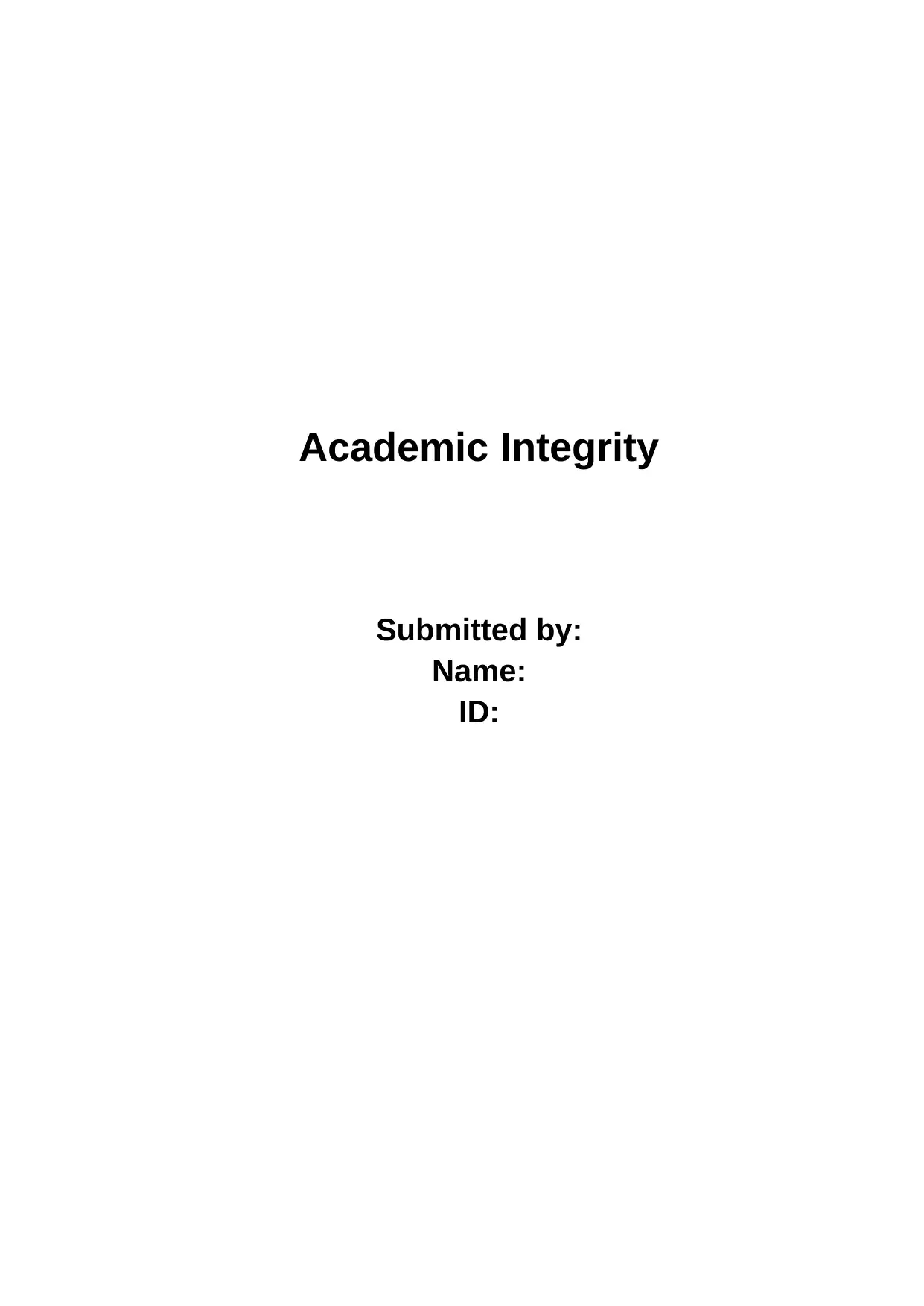
Academic Integrity
Submitted by:
Name:
ID:
Submitted by:
Name:
ID:
Paraphrase This Document
Need a fresh take? Get an instant paraphrase of this document with our AI Paraphraser
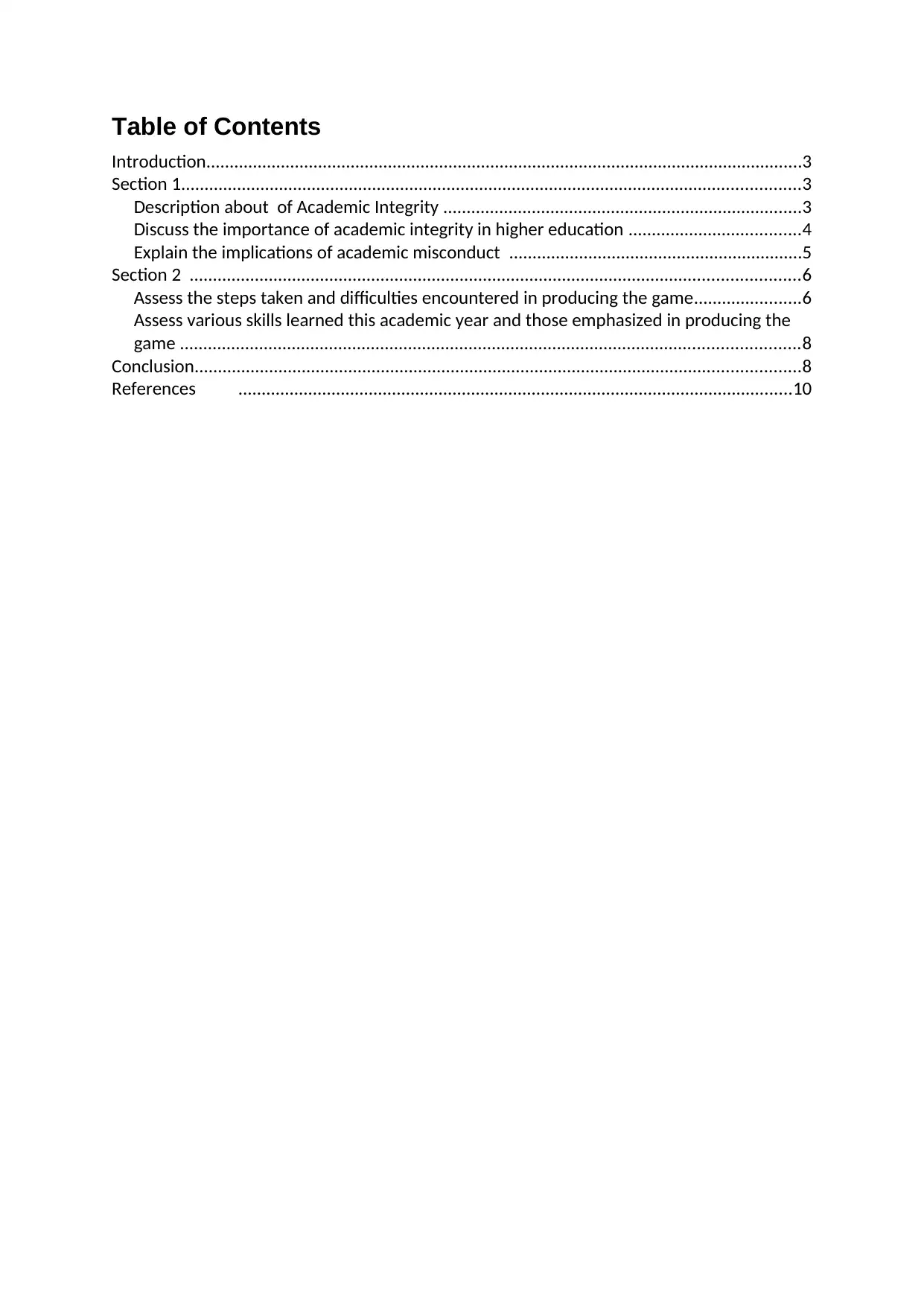
Table of Contents
Introduction................................................................................................................................3
Section 1.....................................................................................................................................3
Description about of Academic Integrity .............................................................................3
Discuss the importance of academic integrity in higher education .....................................4
Explain the implications of academic misconduct ...............................................................5
Section 2 ...................................................................................................................................6
Assess the steps taken and difficulties encountered in producing the game.......................6
Assess various skills learned this academic year and those emphasized in producing the
game .....................................................................................................................................8
Conclusion..................................................................................................................................8
References .......................................................................................................................10
Introduction................................................................................................................................3
Section 1.....................................................................................................................................3
Description about of Academic Integrity .............................................................................3
Discuss the importance of academic integrity in higher education .....................................4
Explain the implications of academic misconduct ...............................................................5
Section 2 ...................................................................................................................................6
Assess the steps taken and difficulties encountered in producing the game.......................6
Assess various skills learned this academic year and those emphasized in producing the
game .....................................................................................................................................8
Conclusion..................................................................................................................................8
References .......................................................................................................................10
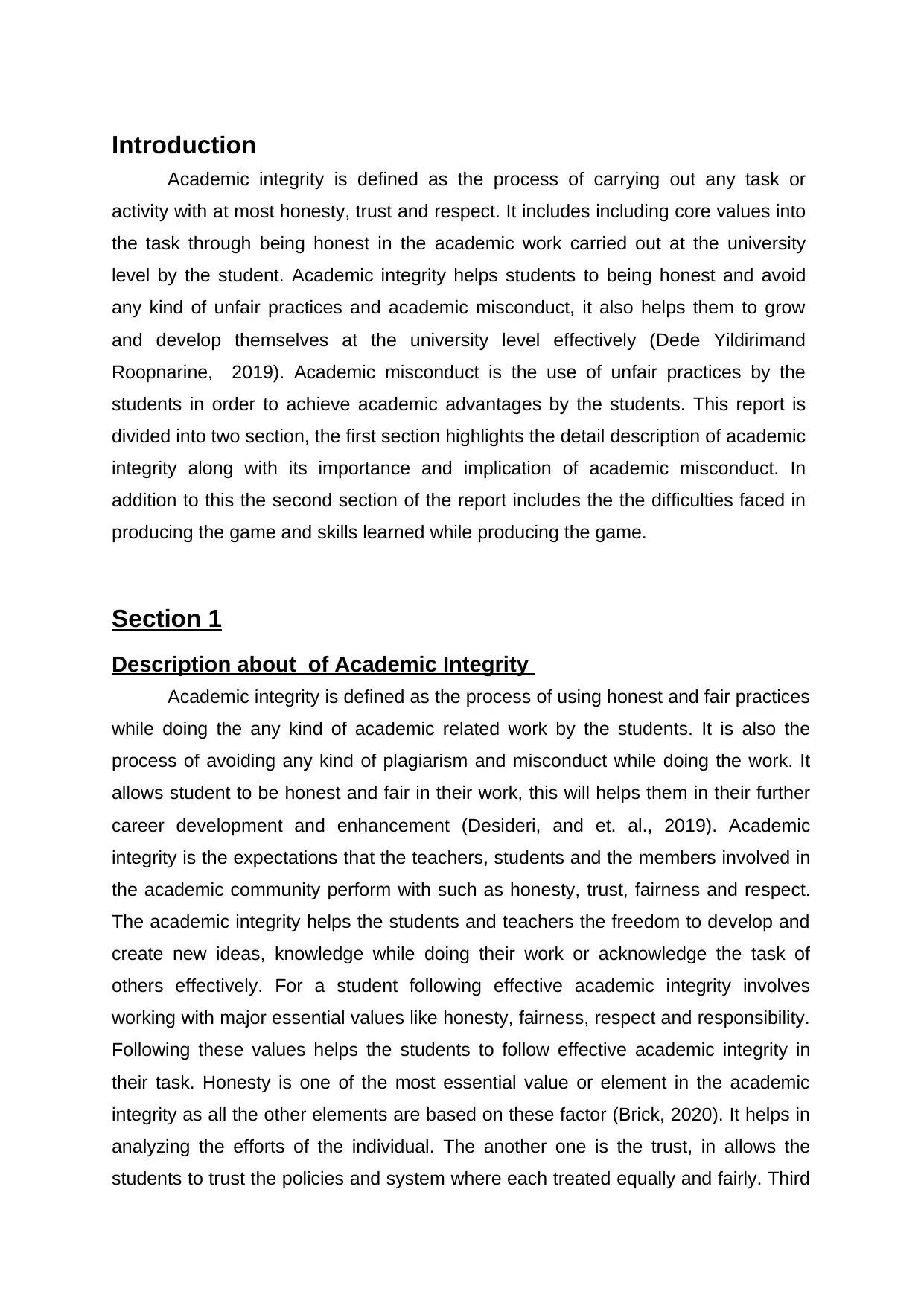
Introduction
Academic integrity is defined as the process of carrying out any task or
activity with at most honesty, trust and respect. It includes including core values into
the task through being honest in the academic work carried out at the university
level by the student. Academic integrity helps students to being honest and avoid
any kind of unfair practices and academic misconduct, it also helps them to grow
and develop themselves at the university level effectively (Dede Yildirimand
Roopnarine, 2019). Academic misconduct is the use of unfair practices by the
students in order to achieve academic advantages by the students. This report is
divided into two section, the first section highlights the detail description of academic
integrity along with its importance and implication of academic misconduct. In
addition to this the second section of the report includes the the difficulties faced in
producing the game and skills learned while producing the game.
Section 1
Description about of Academic Integrity
Academic integrity is defined as the process of using honest and fair practices
while doing the any kind of academic related work by the students. It is also the
process of avoiding any kind of plagiarism and misconduct while doing the work. It
allows student to be honest and fair in their work, this will helps them in their further
career development and enhancement (Desideri, and et. al., 2019). Academic
integrity is the expectations that the teachers, students and the members involved in
the academic community perform with such as honesty, trust, fairness and respect.
The academic integrity helps the students and teachers the freedom to develop and
create new ideas, knowledge while doing their work or acknowledge the task of
others effectively. For a student following effective academic integrity involves
working with major essential values like honesty, fairness, respect and responsibility.
Following these values helps the students to follow effective academic integrity in
their task. Honesty is one of the most essential value or element in the academic
integrity as all the other elements are based on these factor (Brick, 2020). It helps in
analyzing the efforts of the individual. The another one is the trust, in allows the
students to trust the policies and system where each treated equally and fairly. Third
Academic integrity is defined as the process of carrying out any task or
activity with at most honesty, trust and respect. It includes including core values into
the task through being honest in the academic work carried out at the university
level by the student. Academic integrity helps students to being honest and avoid
any kind of unfair practices and academic misconduct, it also helps them to grow
and develop themselves at the university level effectively (Dede Yildirimand
Roopnarine, 2019). Academic misconduct is the use of unfair practices by the
students in order to achieve academic advantages by the students. This report is
divided into two section, the first section highlights the detail description of academic
integrity along with its importance and implication of academic misconduct. In
addition to this the second section of the report includes the the difficulties faced in
producing the game and skills learned while producing the game.
Section 1
Description about of Academic Integrity
Academic integrity is defined as the process of using honest and fair practices
while doing the any kind of academic related work by the students. It is also the
process of avoiding any kind of plagiarism and misconduct while doing the work. It
allows student to be honest and fair in their work, this will helps them in their further
career development and enhancement (Desideri, and et. al., 2019). Academic
integrity is the expectations that the teachers, students and the members involved in
the academic community perform with such as honesty, trust, fairness and respect.
The academic integrity helps the students and teachers the freedom to develop and
create new ideas, knowledge while doing their work or acknowledge the task of
others effectively. For a student following effective academic integrity involves
working with major essential values like honesty, fairness, respect and responsibility.
Following these values helps the students to follow effective academic integrity in
their task. Honesty is one of the most essential value or element in the academic
integrity as all the other elements are based on these factor (Brick, 2020). It helps in
analyzing the efforts of the individual. The another one is the trust, in allows the
students to trust the policies and system where each treated equally and fairly. Third
⊘ This is a preview!⊘
Do you want full access?
Subscribe today to unlock all pages.

Trusted by 1+ million students worldwide
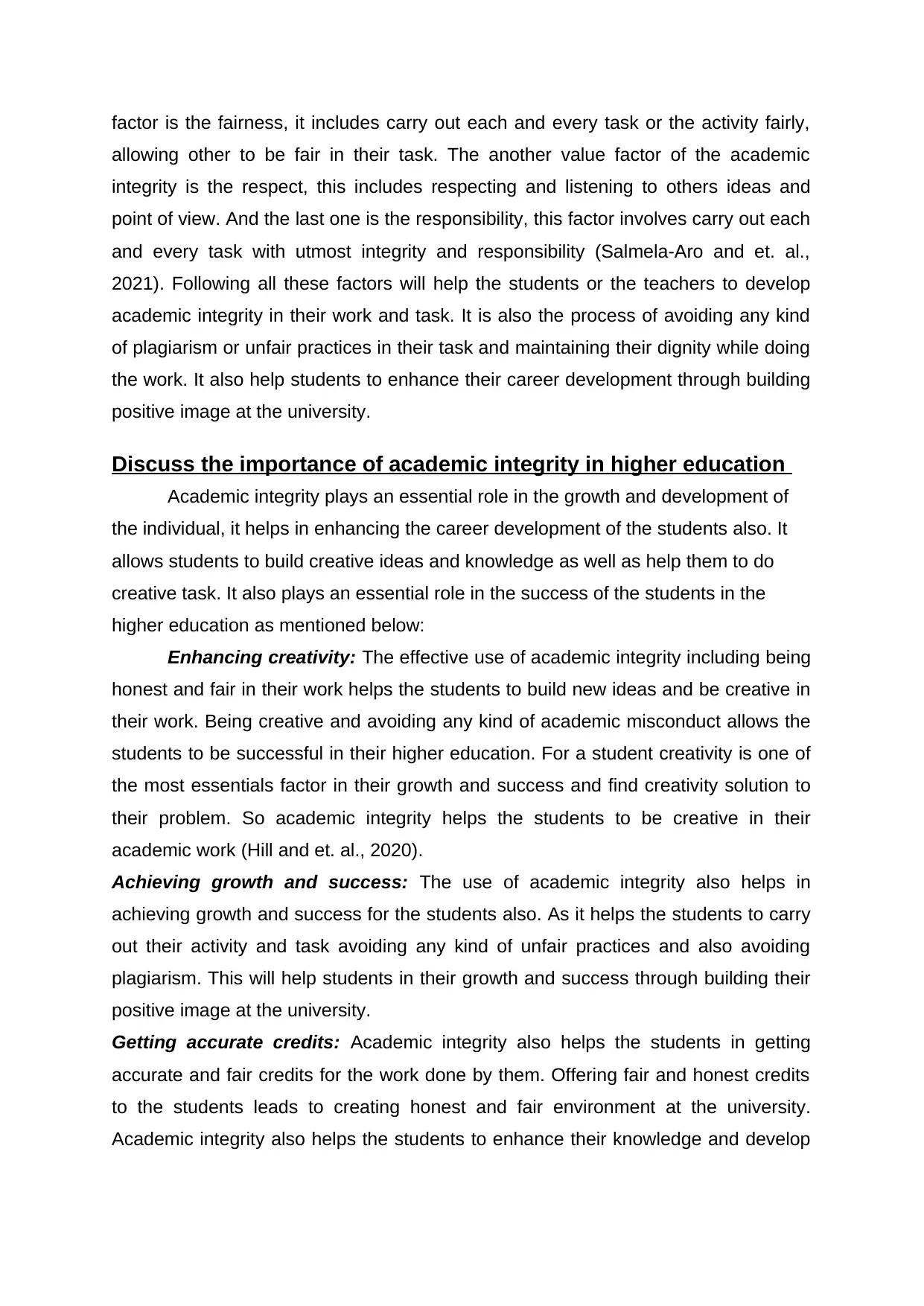
factor is the fairness, it includes carry out each and every task or the activity fairly,
allowing other to be fair in their task. The another value factor of the academic
integrity is the respect, this includes respecting and listening to others ideas and
point of view. And the last one is the responsibility, this factor involves carry out each
and every task with utmost integrity and responsibility (Salmela‐Aro and et. al.,
2021). Following all these factors will help the students or the teachers to develop
academic integrity in their work and task. It is also the process of avoiding any kind
of plagiarism or unfair practices in their task and maintaining their dignity while doing
the work. It also help students to enhance their career development through building
positive image at the university.
Discuss the importance of academic integrity in higher education
Academic integrity plays an essential role in the growth and development of
the individual, it helps in enhancing the career development of the students also. It
allows students to build creative ideas and knowledge as well as help them to do
creative task. It also plays an essential role in the success of the students in the
higher education as mentioned below:
Enhancing creativity: The effective use of academic integrity including being
honest and fair in their work helps the students to build new ideas and be creative in
their work. Being creative and avoiding any kind of academic misconduct allows the
students to be successful in their higher education. For a student creativity is one of
the most essentials factor in their growth and success and find creativity solution to
their problem. So academic integrity helps the students to be creative in their
academic work (Hill and et. al., 2020).
Achieving growth and success: The use of academic integrity also helps in
achieving growth and success for the students also. As it helps the students to carry
out their activity and task avoiding any kind of unfair practices and also avoiding
plagiarism. This will help students in their growth and success through building their
positive image at the university.
Getting accurate credits: Academic integrity also helps the students in getting
accurate and fair credits for the work done by them. Offering fair and honest credits
to the students leads to creating honest and fair environment at the university.
Academic integrity also helps the students to enhance their knowledge and develop
allowing other to be fair in their task. The another value factor of the academic
integrity is the respect, this includes respecting and listening to others ideas and
point of view. And the last one is the responsibility, this factor involves carry out each
and every task with utmost integrity and responsibility (Salmela‐Aro and et. al.,
2021). Following all these factors will help the students or the teachers to develop
academic integrity in their work and task. It is also the process of avoiding any kind
of plagiarism or unfair practices in their task and maintaining their dignity while doing
the work. It also help students to enhance their career development through building
positive image at the university.
Discuss the importance of academic integrity in higher education
Academic integrity plays an essential role in the growth and development of
the individual, it helps in enhancing the career development of the students also. It
allows students to build creative ideas and knowledge as well as help them to do
creative task. It also plays an essential role in the success of the students in the
higher education as mentioned below:
Enhancing creativity: The effective use of academic integrity including being
honest and fair in their work helps the students to build new ideas and be creative in
their work. Being creative and avoiding any kind of academic misconduct allows the
students to be successful in their higher education. For a student creativity is one of
the most essentials factor in their growth and success and find creativity solution to
their problem. So academic integrity helps the students to be creative in their
academic work (Hill and et. al., 2020).
Achieving growth and success: The use of academic integrity also helps in
achieving growth and success for the students also. As it helps the students to carry
out their activity and task avoiding any kind of unfair practices and also avoiding
plagiarism. This will help students in their growth and success through building their
positive image at the university.
Getting accurate credits: Academic integrity also helps the students in getting
accurate and fair credits for the work done by them. Offering fair and honest credits
to the students leads to creating honest and fair environment at the university.
Academic integrity also helps the students to enhance their knowledge and develop
Paraphrase This Document
Need a fresh take? Get an instant paraphrase of this document with our AI Paraphraser
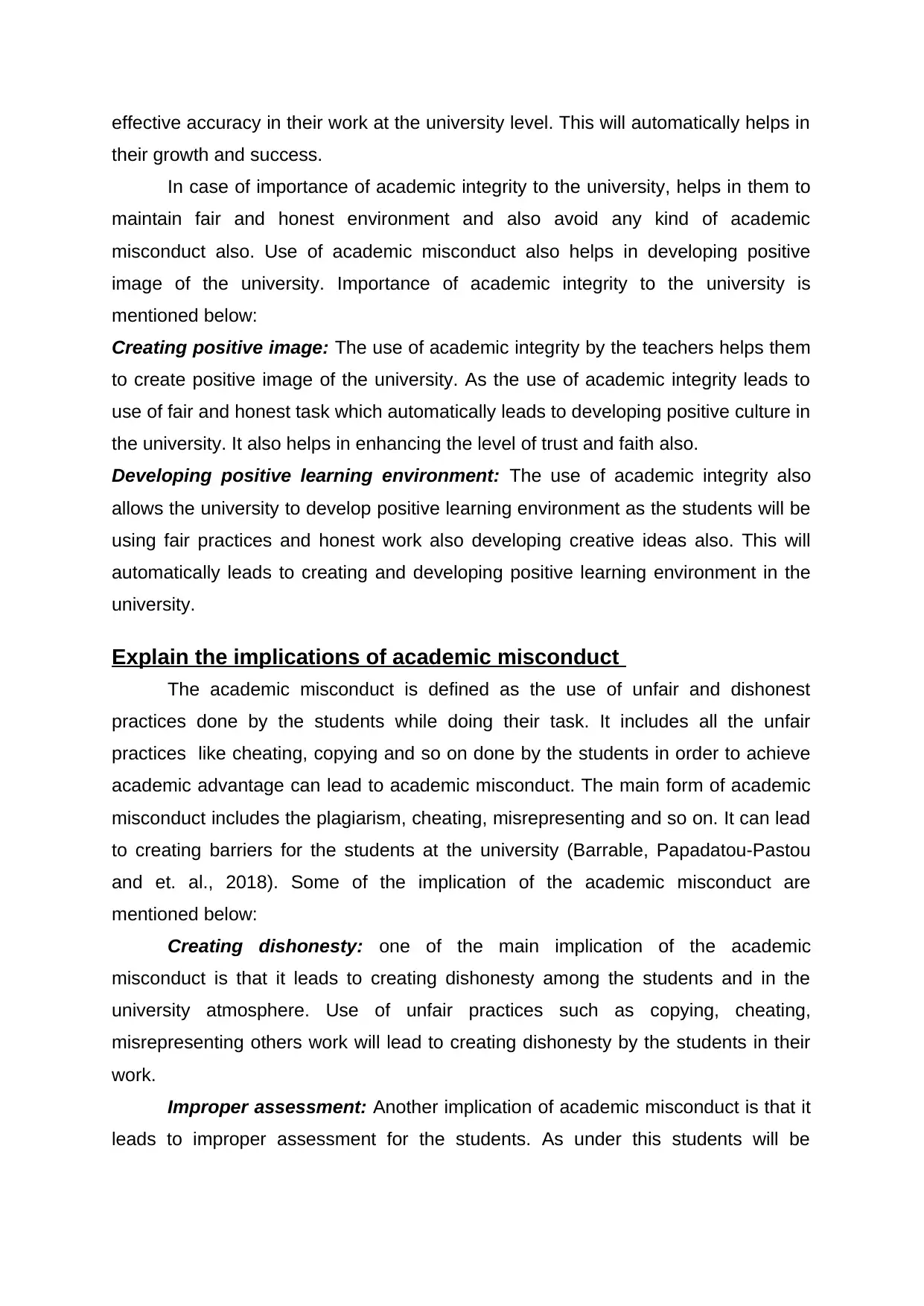
effective accuracy in their work at the university level. This will automatically helps in
their growth and success.
In case of importance of academic integrity to the university, helps in them to
maintain fair and honest environment and also avoid any kind of academic
misconduct also. Use of academic misconduct also helps in developing positive
image of the university. Importance of academic integrity to the university is
mentioned below:
Creating positive image: The use of academic integrity by the teachers helps them
to create positive image of the university. As the use of academic integrity leads to
use of fair and honest task which automatically leads to developing positive culture in
the university. It also helps in enhancing the level of trust and faith also.
Developing positive learning environment: The use of academic integrity also
allows the university to develop positive learning environment as the students will be
using fair practices and honest work also developing creative ideas also. This will
automatically leads to creating and developing positive learning environment in the
university.
Explain the implications of academic misconduct
The academic misconduct is defined as the use of unfair and dishonest
practices done by the students while doing their task. It includes all the unfair
practices like cheating, copying and so on done by the students in order to achieve
academic advantage can lead to academic misconduct. The main form of academic
misconduct includes the plagiarism, cheating, misrepresenting and so on. It can lead
to creating barriers for the students at the university (Barrable, Papadatou-Pastou
and et. al., 2018). Some of the implication of the academic misconduct are
mentioned below:
Creating dishonesty: one of the main implication of the academic
misconduct is that it leads to creating dishonesty among the students and in the
university atmosphere. Use of unfair practices such as copying, cheating,
misrepresenting others work will lead to creating dishonesty by the students in their
work.
Improper assessment: Another implication of academic misconduct is that it
leads to improper assessment for the students. As under this students will be
their growth and success.
In case of importance of academic integrity to the university, helps in them to
maintain fair and honest environment and also avoid any kind of academic
misconduct also. Use of academic misconduct also helps in developing positive
image of the university. Importance of academic integrity to the university is
mentioned below:
Creating positive image: The use of academic integrity by the teachers helps them
to create positive image of the university. As the use of academic integrity leads to
use of fair and honest task which automatically leads to developing positive culture in
the university. It also helps in enhancing the level of trust and faith also.
Developing positive learning environment: The use of academic integrity also
allows the university to develop positive learning environment as the students will be
using fair practices and honest work also developing creative ideas also. This will
automatically leads to creating and developing positive learning environment in the
university.
Explain the implications of academic misconduct
The academic misconduct is defined as the use of unfair and dishonest
practices done by the students while doing their task. It includes all the unfair
practices like cheating, copying and so on done by the students in order to achieve
academic advantage can lead to academic misconduct. The main form of academic
misconduct includes the plagiarism, cheating, misrepresenting and so on. It can lead
to creating barriers for the students at the university (Barrable, Papadatou-Pastou
and et. al., 2018). Some of the implication of the academic misconduct are
mentioned below:
Creating dishonesty: one of the main implication of the academic
misconduct is that it leads to creating dishonesty among the students and in the
university atmosphere. Use of unfair practices such as copying, cheating,
misrepresenting others work will lead to creating dishonesty by the students in their
work.
Improper assessment: Another implication of academic misconduct is that it
leads to improper assessment for the students. As under this students will be
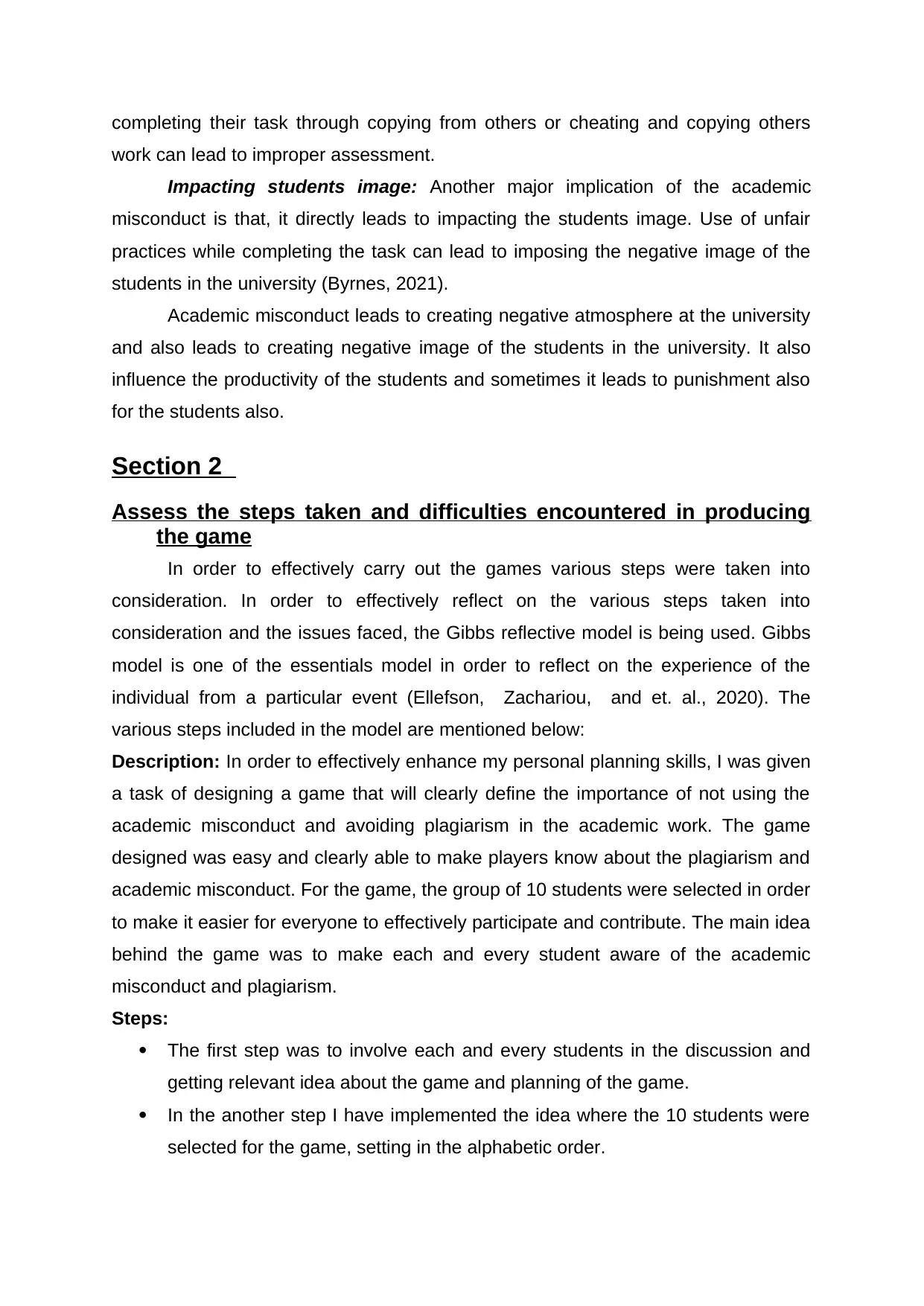
completing their task through copying from others or cheating and copying others
work can lead to improper assessment.
Impacting students image: Another major implication of the academic
misconduct is that, it directly leads to impacting the students image. Use of unfair
practices while completing the task can lead to imposing the negative image of the
students in the university (Byrnes, 2021).
Academic misconduct leads to creating negative atmosphere at the university
and also leads to creating negative image of the students in the university. It also
influence the productivity of the students and sometimes it leads to punishment also
for the students also.
Section 2
Assess the steps taken and difficulties encountered in producing
the game
In order to effectively carry out the games various steps were taken into
consideration. In order to effectively reflect on the various steps taken into
consideration and the issues faced, the Gibbs reflective model is being used. Gibbs
model is one of the essentials model in order to reflect on the experience of the
individual from a particular event (Ellefson, Zachariou, and et. al., 2020). The
various steps included in the model are mentioned below:
Description: In order to effectively enhance my personal planning skills, I was given
a task of designing a game that will clearly define the importance of not using the
academic misconduct and avoiding plagiarism in the academic work. The game
designed was easy and clearly able to make players know about the plagiarism and
academic misconduct. For the game, the group of 10 students were selected in order
to make it easier for everyone to effectively participate and contribute. The main idea
behind the game was to make each and every student aware of the academic
misconduct and plagiarism.
Steps:
The first step was to involve each and every students in the discussion and
getting relevant idea about the game and planning of the game.
In the another step I have implemented the idea where the 10 students were
selected for the game, setting in the alphabetic order.
work can lead to improper assessment.
Impacting students image: Another major implication of the academic
misconduct is that, it directly leads to impacting the students image. Use of unfair
practices while completing the task can lead to imposing the negative image of the
students in the university (Byrnes, 2021).
Academic misconduct leads to creating negative atmosphere at the university
and also leads to creating negative image of the students in the university. It also
influence the productivity of the students and sometimes it leads to punishment also
for the students also.
Section 2
Assess the steps taken and difficulties encountered in producing
the game
In order to effectively carry out the games various steps were taken into
consideration. In order to effectively reflect on the various steps taken into
consideration and the issues faced, the Gibbs reflective model is being used. Gibbs
model is one of the essentials model in order to reflect on the experience of the
individual from a particular event (Ellefson, Zachariou, and et. al., 2020). The
various steps included in the model are mentioned below:
Description: In order to effectively enhance my personal planning skills, I was given
a task of designing a game that will clearly define the importance of not using the
academic misconduct and avoiding plagiarism in the academic work. The game
designed was easy and clearly able to make players know about the plagiarism and
academic misconduct. For the game, the group of 10 students were selected in order
to make it easier for everyone to effectively participate and contribute. The main idea
behind the game was to make each and every student aware of the academic
misconduct and plagiarism.
Steps:
The first step was to involve each and every students in the discussion and
getting relevant idea about the game and planning of the game.
In the another step I have implemented the idea where the 10 students were
selected for the game, setting in the alphabetic order.
⊘ This is a preview!⊘
Do you want full access?
Subscribe today to unlock all pages.

Trusted by 1+ million students worldwide
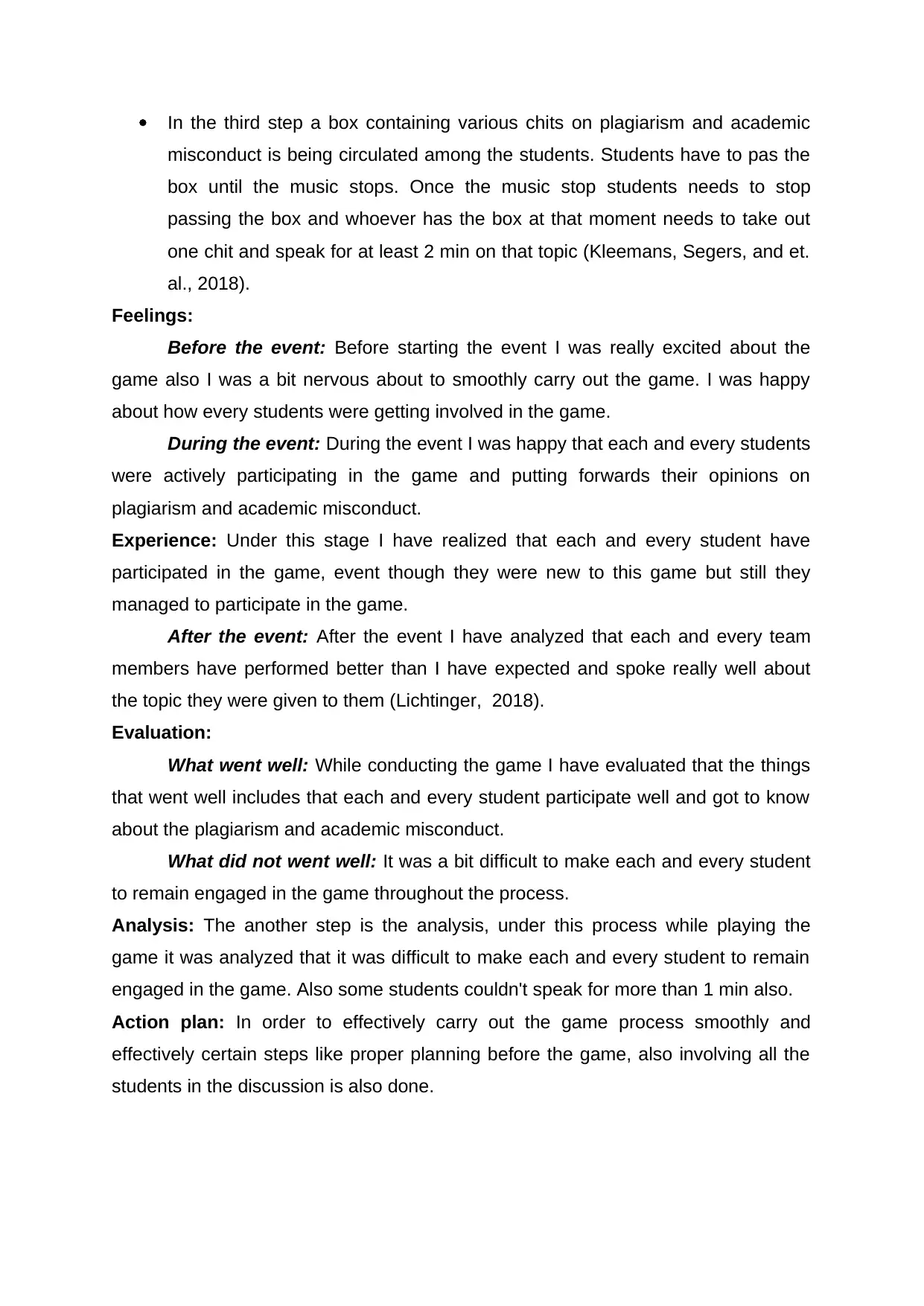
In the third step a box containing various chits on plagiarism and academic
misconduct is being circulated among the students. Students have to pas the
box until the music stops. Once the music stop students needs to stop
passing the box and whoever has the box at that moment needs to take out
one chit and speak for at least 2 min on that topic (Kleemans, Segers, and et.
al., 2018).
Feelings:
Before the event: Before starting the event I was really excited about the
game also I was a bit nervous about to smoothly carry out the game. I was happy
about how every students were getting involved in the game.
During the event: During the event I was happy that each and every students
were actively participating in the game and putting forwards their opinions on
plagiarism and academic misconduct.
Experience: Under this stage I have realized that each and every student have
participated in the game, event though they were new to this game but still they
managed to participate in the game.
After the event: After the event I have analyzed that each and every team
members have performed better than I have expected and spoke really well about
the topic they were given to them (Lichtinger, 2018).
Evaluation:
What went well: While conducting the game I have evaluated that the things
that went well includes that each and every student participate well and got to know
about the plagiarism and academic misconduct.
What did not went well: It was a bit difficult to make each and every student
to remain engaged in the game throughout the process.
Analysis: The another step is the analysis, under this process while playing the
game it was analyzed that it was difficult to make each and every student to remain
engaged in the game. Also some students couldn't speak for more than 1 min also.
Action plan: In order to effectively carry out the game process smoothly and
effectively certain steps like proper planning before the game, also involving all the
students in the discussion is also done.
misconduct is being circulated among the students. Students have to pas the
box until the music stops. Once the music stop students needs to stop
passing the box and whoever has the box at that moment needs to take out
one chit and speak for at least 2 min on that topic (Kleemans, Segers, and et.
al., 2018).
Feelings:
Before the event: Before starting the event I was really excited about the
game also I was a bit nervous about to smoothly carry out the game. I was happy
about how every students were getting involved in the game.
During the event: During the event I was happy that each and every students
were actively participating in the game and putting forwards their opinions on
plagiarism and academic misconduct.
Experience: Under this stage I have realized that each and every student have
participated in the game, event though they were new to this game but still they
managed to participate in the game.
After the event: After the event I have analyzed that each and every team
members have performed better than I have expected and spoke really well about
the topic they were given to them (Lichtinger, 2018).
Evaluation:
What went well: While conducting the game I have evaluated that the things
that went well includes that each and every student participate well and got to know
about the plagiarism and academic misconduct.
What did not went well: It was a bit difficult to make each and every student
to remain engaged in the game throughout the process.
Analysis: The another step is the analysis, under this process while playing the
game it was analyzed that it was difficult to make each and every student to remain
engaged in the game. Also some students couldn't speak for more than 1 min also.
Action plan: In order to effectively carry out the game process smoothly and
effectively certain steps like proper planning before the game, also involving all the
students in the discussion is also done.
Paraphrase This Document
Need a fresh take? Get an instant paraphrase of this document with our AI Paraphraser
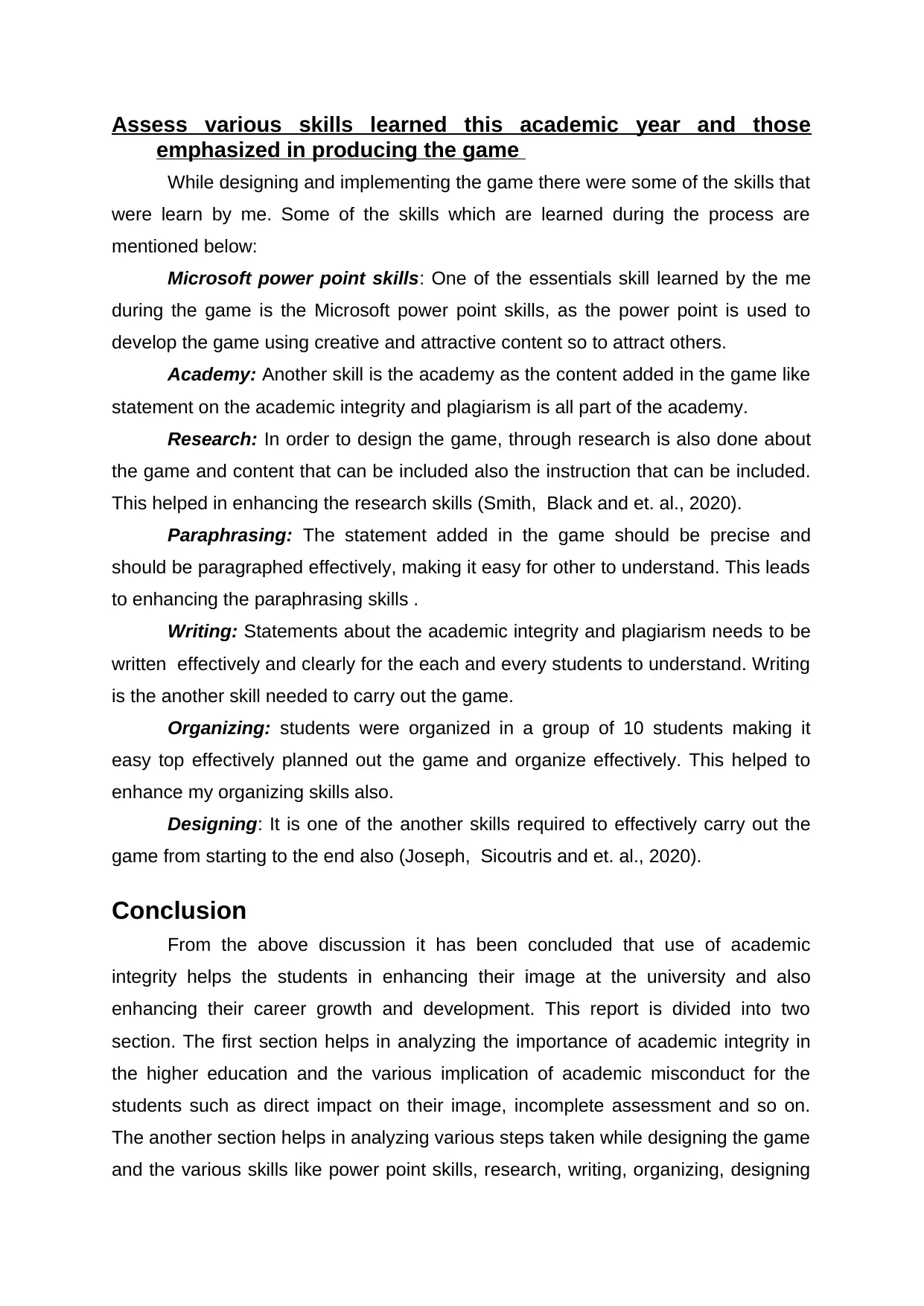
Assess various skills learned this academic year and those
emphasized in producing the game
While designing and implementing the game there were some of the skills that
were learn by me. Some of the skills which are learned during the process are
mentioned below:
Microsoft power point skills: One of the essentials skill learned by the me
during the game is the Microsoft power point skills, as the power point is used to
develop the game using creative and attractive content so to attract others.
Academy: Another skill is the academy as the content added in the game like
statement on the academic integrity and plagiarism is all part of the academy.
Research: In order to design the game, through research is also done about
the game and content that can be included also the instruction that can be included.
This helped in enhancing the research skills (Smith, Black and et. al., 2020).
Paraphrasing: The statement added in the game should be precise and
should be paragraphed effectively, making it easy for other to understand. This leads
to enhancing the paraphrasing skills .
Writing: Statements about the academic integrity and plagiarism needs to be
written effectively and clearly for the each and every students to understand. Writing
is the another skill needed to carry out the game.
Organizing: students were organized in a group of 10 students making it
easy top effectively planned out the game and organize effectively. This helped to
enhance my organizing skills also.
Designing: It is one of the another skills required to effectively carry out the
game from starting to the end also (Joseph, Sicoutris and et. al., 2020).
Conclusion
From the above discussion it has been concluded that use of academic
integrity helps the students in enhancing their image at the university and also
enhancing their career growth and development. This report is divided into two
section. The first section helps in analyzing the importance of academic integrity in
the higher education and the various implication of academic misconduct for the
students such as direct impact on their image, incomplete assessment and so on.
The another section helps in analyzing various steps taken while designing the game
and the various skills like power point skills, research, writing, organizing, designing
emphasized in producing the game
While designing and implementing the game there were some of the skills that
were learn by me. Some of the skills which are learned during the process are
mentioned below:
Microsoft power point skills: One of the essentials skill learned by the me
during the game is the Microsoft power point skills, as the power point is used to
develop the game using creative and attractive content so to attract others.
Academy: Another skill is the academy as the content added in the game like
statement on the academic integrity and plagiarism is all part of the academy.
Research: In order to design the game, through research is also done about
the game and content that can be included also the instruction that can be included.
This helped in enhancing the research skills (Smith, Black and et. al., 2020).
Paraphrasing: The statement added in the game should be precise and
should be paragraphed effectively, making it easy for other to understand. This leads
to enhancing the paraphrasing skills .
Writing: Statements about the academic integrity and plagiarism needs to be
written effectively and clearly for the each and every students to understand. Writing
is the another skill needed to carry out the game.
Organizing: students were organized in a group of 10 students making it
easy top effectively planned out the game and organize effectively. This helped to
enhance my organizing skills also.
Designing: It is one of the another skills required to effectively carry out the
game from starting to the end also (Joseph, Sicoutris and et. al., 2020).
Conclusion
From the above discussion it has been concluded that use of academic
integrity helps the students in enhancing their image at the university and also
enhancing their career growth and development. This report is divided into two
section. The first section helps in analyzing the importance of academic integrity in
the higher education and the various implication of academic misconduct for the
students such as direct impact on their image, incomplete assessment and so on.
The another section helps in analyzing various steps taken while designing the game
and the various skills like power point skills, research, writing, organizing, designing

and so on also analyzed in this report.
⊘ This is a preview!⊘
Do you want full access?
Subscribe today to unlock all pages.

Trusted by 1+ million students worldwide
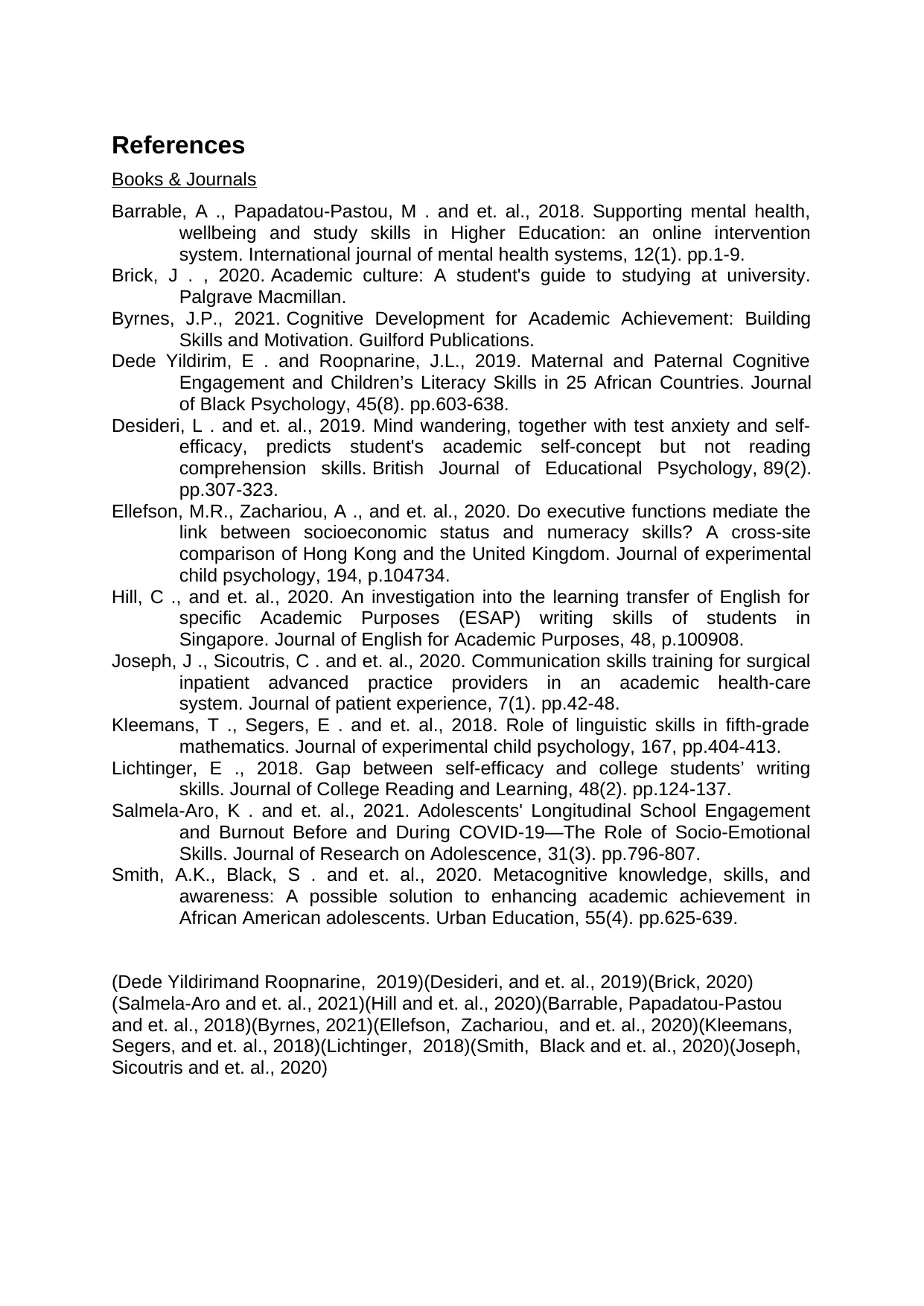
References
Books & Journals
Barrable, A ., Papadatou-Pastou, M . and et. al., 2018. Supporting mental health,
wellbeing and study skills in Higher Education: an online intervention
system. International journal of mental health systems, 12(1). pp.1-9.
Brick, J . , 2020. Academic culture: A student's guide to studying at university.
Palgrave Macmillan.
Byrnes, J.P., 2021. Cognitive Development for Academic Achievement: Building
Skills and Motivation. Guilford Publications.
Dede Yildirim, E . and Roopnarine, J.L., 2019. Maternal and Paternal Cognitive
Engagement and Children’s Literacy Skills in 25 African Countries. Journal
of Black Psychology, 45(8). pp.603-638.
Desideri, L . and et. al., 2019. Mind wandering, together with test anxiety and self‐
efficacy, predicts student's academic self‐concept but not reading
comprehension skills. British Journal of Educational Psychology, 89(2).
pp.307-323.
Ellefson, M.R., Zachariou, A ., and et. al., 2020. Do executive functions mediate the
link between socioeconomic status and numeracy skills? A cross-site
comparison of Hong Kong and the United Kingdom. Journal of experimental
child psychology, 194, p.104734.
Hill, C ., and et. al., 2020. An investigation into the learning transfer of English for
specific Academic Purposes (ESAP) writing skills of students in
Singapore. Journal of English for Academic Purposes, 48, p.100908.
Joseph, J ., Sicoutris, C . and et. al., 2020. Communication skills training for surgical
inpatient advanced practice providers in an academic health-care
system. Journal of patient experience, 7(1). pp.42-48.
Kleemans, T ., Segers, E . and et. al., 2018. Role of linguistic skills in fifth-grade
mathematics. Journal of experimental child psychology, 167, pp.404-413.
Lichtinger, E ., 2018. Gap between self-efficacy and college students’ writing
skills. Journal of College Reading and Learning, 48(2). pp.124-137.
Salmela‐Aro, K . and et. al., 2021. Adolescents' Longitudinal School Engagement
and Burnout Before and During COVID‐19—The Role of Socio‐Emotional
Skills. Journal of Research on Adolescence, 31(3). pp.796-807.
Smith, A.K., Black, S . and et. al., 2020. Metacognitive knowledge, skills, and
awareness: A possible solution to enhancing academic achievement in
African American adolescents. Urban Education, 55(4). pp.625-639.
(Dede Yildirimand Roopnarine, 2019)(Desideri, and et. al., 2019)(Brick, 2020)
(Salmela‐Aro and et. al., 2021)(Hill and et. al., 2020)(Barrable, Papadatou-Pastou
and et. al., 2018)(Byrnes, 2021)(Ellefson, Zachariou, and et. al., 2020)(Kleemans,
Segers, and et. al., 2018)(Lichtinger, 2018)(Smith, Black and et. al., 2020)(Joseph,
Sicoutris and et. al., 2020)
Books & Journals
Barrable, A ., Papadatou-Pastou, M . and et. al., 2018. Supporting mental health,
wellbeing and study skills in Higher Education: an online intervention
system. International journal of mental health systems, 12(1). pp.1-9.
Brick, J . , 2020. Academic culture: A student's guide to studying at university.
Palgrave Macmillan.
Byrnes, J.P., 2021. Cognitive Development for Academic Achievement: Building
Skills and Motivation. Guilford Publications.
Dede Yildirim, E . and Roopnarine, J.L., 2019. Maternal and Paternal Cognitive
Engagement and Children’s Literacy Skills in 25 African Countries. Journal
of Black Psychology, 45(8). pp.603-638.
Desideri, L . and et. al., 2019. Mind wandering, together with test anxiety and self‐
efficacy, predicts student's academic self‐concept but not reading
comprehension skills. British Journal of Educational Psychology, 89(2).
pp.307-323.
Ellefson, M.R., Zachariou, A ., and et. al., 2020. Do executive functions mediate the
link between socioeconomic status and numeracy skills? A cross-site
comparison of Hong Kong and the United Kingdom. Journal of experimental
child psychology, 194, p.104734.
Hill, C ., and et. al., 2020. An investigation into the learning transfer of English for
specific Academic Purposes (ESAP) writing skills of students in
Singapore. Journal of English for Academic Purposes, 48, p.100908.
Joseph, J ., Sicoutris, C . and et. al., 2020. Communication skills training for surgical
inpatient advanced practice providers in an academic health-care
system. Journal of patient experience, 7(1). pp.42-48.
Kleemans, T ., Segers, E . and et. al., 2018. Role of linguistic skills in fifth-grade
mathematics. Journal of experimental child psychology, 167, pp.404-413.
Lichtinger, E ., 2018. Gap between self-efficacy and college students’ writing
skills. Journal of College Reading and Learning, 48(2). pp.124-137.
Salmela‐Aro, K . and et. al., 2021. Adolescents' Longitudinal School Engagement
and Burnout Before and During COVID‐19—The Role of Socio‐Emotional
Skills. Journal of Research on Adolescence, 31(3). pp.796-807.
Smith, A.K., Black, S . and et. al., 2020. Metacognitive knowledge, skills, and
awareness: A possible solution to enhancing academic achievement in
African American adolescents. Urban Education, 55(4). pp.625-639.
(Dede Yildirimand Roopnarine, 2019)(Desideri, and et. al., 2019)(Brick, 2020)
(Salmela‐Aro and et. al., 2021)(Hill and et. al., 2020)(Barrable, Papadatou-Pastou
and et. al., 2018)(Byrnes, 2021)(Ellefson, Zachariou, and et. al., 2020)(Kleemans,
Segers, and et. al., 2018)(Lichtinger, 2018)(Smith, Black and et. al., 2020)(Joseph,
Sicoutris and et. al., 2020)
1 out of 10
Related Documents
Your All-in-One AI-Powered Toolkit for Academic Success.
+13062052269
info@desklib.com
Available 24*7 on WhatsApp / Email
![[object Object]](/_next/static/media/star-bottom.7253800d.svg)
Unlock your academic potential
Copyright © 2020–2026 A2Z Services. All Rights Reserved. Developed and managed by ZUCOL.


